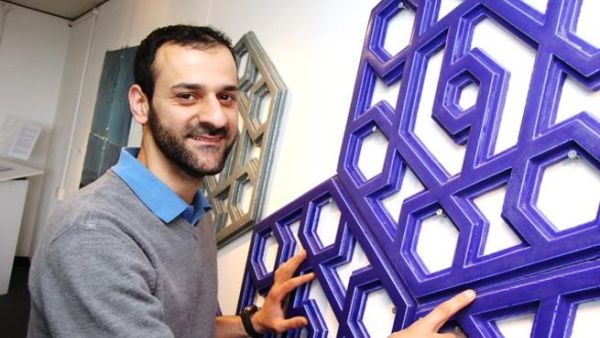Ceramics exhibition catches eye

A Kuwaiti PhD graduate from the University of Central Lancashire (UCLan) has taken inspiration from old and new to help spark a cultural revival in contemporary Islamic ceramics after he became aware of the gradual erosion of aesthetic richness of traditional Islamic architecture.
Fahad Alkandari, formerly a ceramics teacher in Kuwait, gained the inspiration for his project after beginning to research the traditions of Kuwaiti ceramic architecture and ironically drawing a blank in his own country. After travelling to the UK and visiting the British Museum where he uncovered new, previously unseen information which he’d never seen before, Fahad was inspired to research traditional, Islamic ceramic techniques and reinterpret them with a contemporary twist.
“I was born in Kuwait and grew up in an Arabic and Islamic environment,” explained Fahad. “Over the years I’d noticed an erosion of traditional ceramic ornamentation in Kuwaiti architecture which was being replaced with something much more international.”
Through a series of case-studies, Fahad’s final PhD show demonstrated how ceramics can be used to re-introduce a sense of Islamic identity within contemporary architecture, offering design proposals, new materials and technical processes that acknowledge the rich traditions of Islamic ceramics. The work can be applied within the context of contemporary Islamic architecture detailing, blending contemporary aesthetics and technical thinking with traditional Islamic design.
Fahad’s case studies employed a number of new technologies such as 3D solid modelling, CNC rapid prototyping and laser-cutting, to prove that modern design and manufacturing technologies can be integrated within traditional ceramic processes. The aim of the research has been to both provide ceramic products that architects and designers can use to enhance the modern architectural environment of Kuwait and re-establish the creative status of ceramics.
Through his research Fahad discovered that almost 100% of Kuwaiti ceramic distributors obtained their products from outside Kuwait in countries such as Italy, Spain and China and that here there is huge potential for Kuwaiti entrepreneurs to exploit this gap in the market. Fahad went on to state that he believes some of these tycoons could come from his own students who he’ll be teaching at the Public Authority for Training and Education in Al-Adaliah, once he returns to Kuwait.
“I’m really looking forward to inspiring the next generation of Kuwaiti students through this new ceramic style,” he said. “In the years to come I’m sure we will see the emergence of a new contemporary style of ceramic architecture in Kuwait and if I’ve helped to play a part I’ll be very proud.”
David Binns, Director of Studies and a Reader in Contemporary Ceramics in UCLan's School of Art, Design & Performance said:
“I was absolutely delighted to learn last week that Fahad was awarded a PhD for his project. His research, part theory and part practice has been very thorough, examining many important issues of cultural identity and erosion. The practice-based element of his research has been particularly impressive.
“Working within the UCLan Silicates Research Unit, Fahad has produced a series of eight different projects that all demonstrate how ceramics can be used to embellish contemporary architecture in Kuwait and other Gulf State countries - blending the rich tradition of Islamic ceramics with 21st Century architecture. I would like to congratulate Fahad on this magnificent achievement, and wish him every success in the future.”
Background Information
University of Central Lancashire
In 1828, the University of Central Lancashire was founded in Preston as the Institution for the Diffusion of Knowledge. ‘Ex solo ad solem’, or in translation, ‘From the Earth to the Sun’, has been its motto ever since – helping talented people from all walks of life to make the most of their potential.






